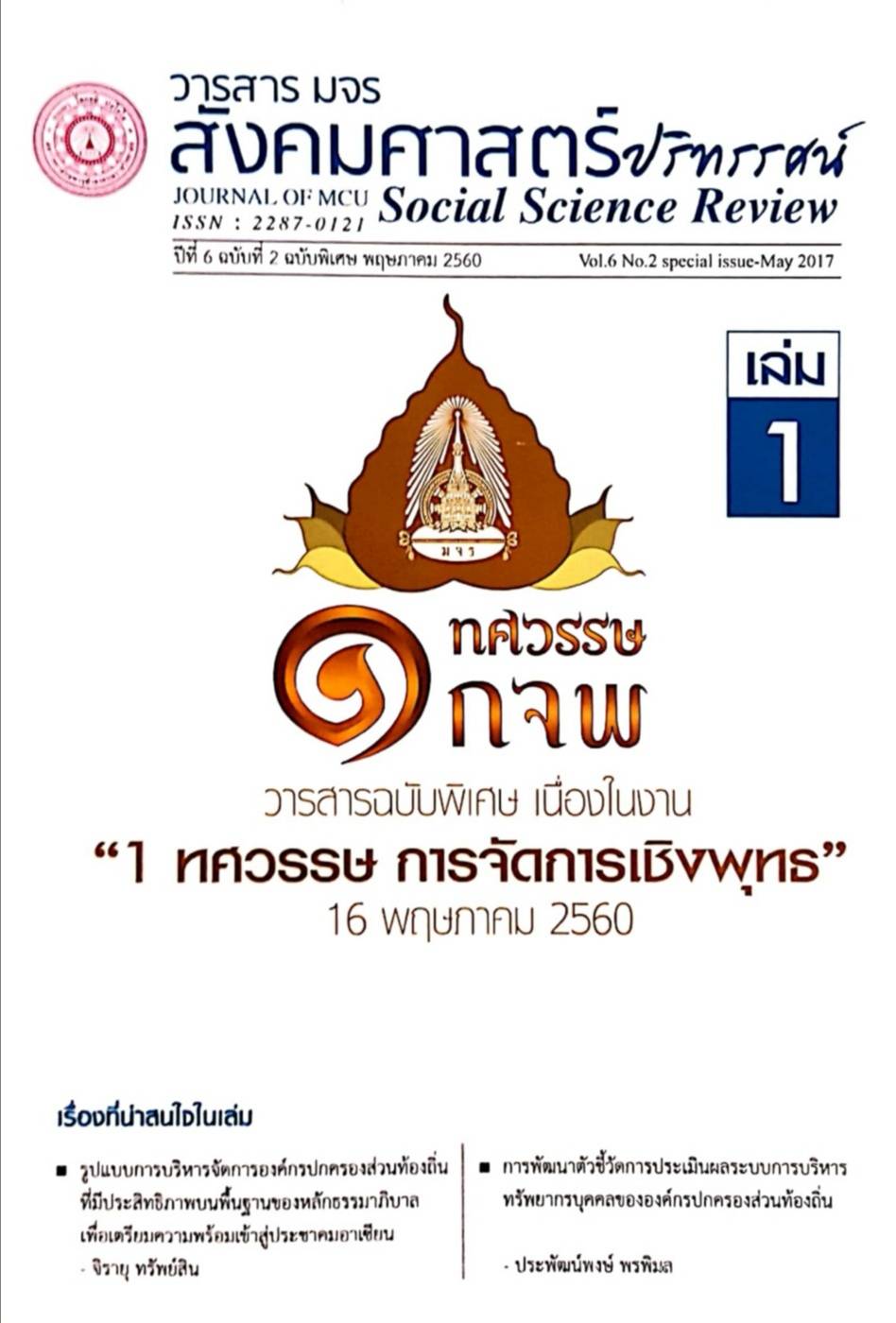กลุ่มผู้มีส่วนได้ส่วนเสียกับประสิทธิผลการบริหารจัดการกิจการเพื่อสังคมด้าน อุตสาหกรรมอาหารอินทรีย์ในประเทศไทย
คำสำคัญ:
กลุ่มผู้มีส่วนได้ส่วนได้ส่วนเสีย, ประสิทธิผลการบริหารจัดการ, กิจการเพื่อสังคม, อุสาหกรรมอาหารอินทรีย์บทคัดย่อ
การวิจัยครั้งนี้มีวัตถุประสงค์เพื่อศึกษาคุณลักษณะของการบริหารจัดการผู้มีส่วนได้
ส่วนเสียที่ส่งผลต่อประสิทธิผลการบริหารจัดการกิจการ เพื่อสังคมด้านอุตสาหกรรมอาหาร
อินทรีย์ในประเทศไทย โดยใช้ระเบียบวิธีการวิจัยเชิงคุณภาพ โดยผู้ให้ข้อมูลสาคัญประกอบไป
ด้วย3 กลุ่ม ได้แก่ กลุ่มผู้ประกอบการกิจการเพื่อสังคมด้านอุตสาหกรรมอาหารอินทรีย์
กลุ่มนักวิชาการผู้ทรงคุณวุฒิและผู้เชี่ยวชาญที่มีความรู้ในเรื่องกิจการเพื่อสังคม และกลุ่มผู้มีส่วน
ได้ส่วนเสียของกิจการเพื่อสังคม การวิจัยครั้งนี้มีการเก็บรวบรวมข้อมูลโดยการสัมภาษณ์เจาะลึก
และการสังเกตการณ์ เครื่องมือที่ใช้ในการวิจัย ได้แก่ แบบสัมภาษณ์รายบุคคลกึ่งโครงสร้าง ที่มี
ประเด็นคาถามที่ครอบคลุมตามวัตถุประสงค์ของการวิจัย โดยสร้างขึ้นตามกรอบแนวคิดการ
วิจัยที่พัฒนาขึ้นจากการศึกษาแนวคิดและทฤษฎีที่เกี่ยวข้อง
ผลการศึกษาพบว่า การบริหารจัดการผู้มีส่วนได้ส่วนเสียมีความสาคัญมากและส่งผล
ต่อประสิทธิผลการบริหารจัดการกิจการเพื่อสังคม โดยคุณลักษณะการบริหารจัดการผู้มีส่วนได้
ส่วนเสียที่ส่งผลต่อประสิทธิผลการบริหารจัดการกิจการเพื่อสังคมด้านอุตสาหกรรมอาหาร
อินทรีย์ในประเทศไทย ได้แก่ 1) การจ่ายค่าตอบแทนที่เป็นธรรม 2) การเปิดโอกาสให้พนักงาน
มีส่วนร่วมในการบริหารจัดการ 3) การมีเงินปันผลให้กับผู้ถือหุ้น 4) การทางานเป็นหุ้นส่วนกัน
5) การทาเกษตรกรรมที่พึ่งพาธรรมชาติอย่างแท้จริง 6) การจาหน่ายอาหารอินทรีย์ที่คัดสรร
วัตถุดิบที่สะอาดปลอดภัย 7) การประชาสัมพันธ์แหล่งที่มาอาหารอินทรีย์
เอกสารอ้างอิง
and environmental enterprises. Gland : the SEED Initiative and
International Institute for Sustainable Development.
Freeman, R.E. (1984). Strategic Management : A Stakeholder Approach. MA. :
Pitman.
Jonker, J., & Foster, D. (2005). Stakeholder relationships : the dialogue of
engagement. Corporate Governance: The international journal of
business in society, 5(5), 51-57.
Post, J. E., Lawrence, A.T., & Weber, J. (2002). Business and society : Corporate
strategy, public policy, ethics. Boston, MA: McGraw-Hill.
12 ปีที่ 6 ฉบับที่ 2 (ฉบับพิเศษ) เมษายน-มิถุนายน 2560
Raudeliuniene, J., Tvaronaviciene, M. & Dzemyda, I. (2014). Towards Economic
Security and Sustainability : Key Success Factors of Sustainable
Entrepreneurship in Conditions of Global Economy. Journal of Security
and Sustainability Issues, 3(4), 79.
The Benevolent Society. (2013). The benefits and challenges of running a social
enterprise. Paddington : The Benevolent Society
Wronka, M. (2013). Analyzing the Success of Social Enterprises – Critical Success
Factors Perspective. Zadar : ToKnowPress.
กระทรวงพาณิชย์. (2558). ตลาดเกษตรอินทรีย์ในต่างประเทศ. เข้าถึงได้จาก
http://www.organic.moc.go.th/th/market/market_abroad. เข้าถึงเมื่อวันที่
28 สิงหาคม 2558.
กระทรวงอุตสาหกรรม. (2558). สศอ.ผลักดันความเชื่อมั่น “ครัว”ไทย ด้วย Eat Safe
EatSmart รับกระแส Food Safety อาเซียน-โลก. เข้าถึงได้จาก
http://www.industry.go.th/center_mng_gad/index.php. เข้าถึงเมื่อวันที่ 25
สิงหาคม 2558.
กาญจนา สมมิตร. (2557). สถานการณ์ธุรกิจเพื่อสังคมภายใต้บริบททุนทางสังคมในอาเภอหาง
ดง จังหวัดเชียงใหม่. วารสารวิชาการมหาวิทยาลัยฟาร์อีสเทอร์น, 7(2), 120- 131
คณะวิจัยโครงการกิจการเพื่อสังคมน้าดี 50 องค์กร. (2553). กิจการเพื่อสังคมน้าดี 50 องค์กร.
กรุงเทพฯ : กรุงเทพธุรกิจ.
สถาบันเช้นจ์ฟิวชัน ภายใต้มูลนิธิบูรณะชนบทแห่งประเทศไทยในพระบรมราชูปถัมภ์. (2553).
รายงานวิจัยฉบับสมบูรณ์ โครงการสร้างเสริมองค์กรธุรกิจเพื่อสังคม (Social
Enterprise) ที่ได้รับการสนับสนุนงบประมาณจากศูนย์คุณธรรม ปีงบประมาณ
2552. กรุงเทพฯ : สถาบันเช้นจ์ฟิวชัน.
สานักงานเศรษฐกิจอุตสาหกรรม กระทรวงอุตสาหกรรม. (2556). โครงการจัดทาแผนแม่บทเพื่อ
การพัฒนาอุตสาหกรรมการเกษตรอย่างยั่งยืน รายงานการศึกษาฉบับสมบูรณ์.
กรุงเทพฯ : สานักงานเศรษฐกิจอุตสาหกรรม.
สานักงานสร้างเสริมกิจการเพื่อสังคม. (2554). ความหมายและคุณลักษณะของ SE. เข้าถึงได้
จากhttp://www.tseo.or.th/about/social-enterprise/means. เข้าถึงวันที่ 20
สิงหาคม 2558.
ดาวน์โหลด
เผยแพร่แล้ว
รูปแบบการอ้างอิง
ฉบับ
ประเภทบทความ
สัญญาอนุญาต
ลิขสิทธิ์ (c) 2020 วารสาร มจร สังคมศาสตร์ปริทรรศน์

อนุญาตภายใต้เงื่อนไข Creative Commons Attribution-NonCommercial-NoDerivatives 4.0 International License.
เพื่อให้เป็นไปตามกฎหมายลิขสิทธิ์ ผู้นิพนธ์ทุกท่านต้องลงลายมือชื่อในแบบฟอร์มใบมอบลิขสิทธิ์บทความให้แก่วารสารฯ พร้อมกับบทความต้นฉบับที่ได้แก้ไขครั้งสุดท้าย นอกจากนี้ ผู้นิพนธ์ทุกท่านต้องยืนยันว่าบทความต้นฉบับที่ส่งมาตีพิมพ์นั้น ได้ส่งมาตีพิมพ์เฉพาะในวารสาร มจร สังคมศาสตร์ปริทรรศน์ เพียงแห่งเดียวเท่านั้น หากมีการใช้ภาพหรือตารางหรือเนื้อหาอื่นๆ ของผู้นิพนธ์อื่นที่ปรากฏในสิ่งตีพิมพ์อื่นมาแล้ว ผู้นิพนธ์ต้องขออนุญาตเจ้าของลิขสิทธิ์ก่อน พร้อมทั้งแสดงหนังสือที่ได้รับการยินยอมต่อบรรณาธิการ ก่อนที่บทความจะได้รับการตีพิมพ์ หากไม่เป็นไปตามข้อกำหนดเบื้องต้น ทางวารสารจะถอดบทความของท่านออกโดยไม่มีข้อยกเว้นใดๆ ทั้งสิ้น





